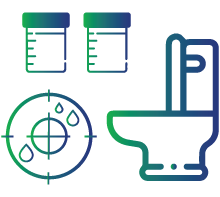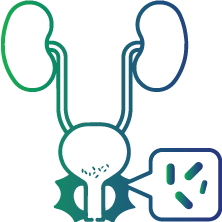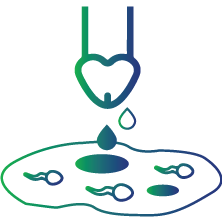
Prostate Specific Antigen, Free (Free PSA)
Prostate Specific Antigen, Free (Free PSA)
The prostate-specific antigen (PSA) free test measures the level of prostate-specific antigen that is not attached to the proteins in your blood. PSA is a protein present in the prostate gland (male reproductive gland) that is produced by both normal cells and cancerous cells of the prostate. Healthcare providers use this test to screen for the level of free PSA in your blood and detect any diseases associated with the prostate gland.
A PSA-free test is done to determine the levels of unbound PSA in your blood. Normally, the level of free PSA is low in the blood, which maintains healthy reproductive functions in males. Having a high free PSA level might affect the prostate gland in several ways. Thus, getting your free PSA test is recommended to prevent serious health conditions related to the prostate gland.
The blood contains two different types of PSA. While one type is unattached and freely circulates (free PSA), the other is attached to blood proteins (total PSA). The percentage of free PSA (FPSA), which is measured as a percentage of total PSA, is lower in men with prostate cancer than in men without the disease
What is a Free-PSA test used for?
Free-PSA test is used to determine

Prostatitis (swelling or inflammation of the prostate)

Benign prostatic hyperplasia (Enlarged prostate)

Prostate cancer

Long-term medical conditions (prostate-related)
Symptoms of high Free-PSA in males

Fever or body pains

Pelvic pain

Blood in urine

Pain during urination

Pain in the scrotum

Discomfort after ejaculation
Who should get tested?
A Free-PSA test is recommended to be performed frequently for males who are at increased risk of having higher levels of PSA, including those who:

Are over the age of 50

Experience recurrent urinary tract infection

Complain of blood in seminal fluid

Experience pain in the penis

Use medication that affect PSA

Have erectile dysfunction
Test preparation:
The prostate-specific antigen free-test is a simple blood test. It is recommended to avoid sex before 24 hours of sample collection. Inform your healthcare provider about your medications, physical activity, and diet because all of these might be reasons for elevated levels of PSA. It is not recommended to give a sample if you have a recent urinary infection or if you have undergone a rectal examination and have given a sample for a biopsy of the prostate
Interpretation of results
Free Prostate-Specific Antigen
|
%Free PSA |
Probability of Cancer |
|
25% |
8% |
|
20-25% |
16% |
|
15-20% |
20% |
|
10-15% |
28% |
|
0-10% |
56% |
PSA range in Nanograms per milli litre
|
Age |
Normal Range of PSA (ng/ml) |
|
40-49 years |
0-2.5 |
|
50-59 years |
0-3.5 |
|
60- 69 years |
0-4.5 |
|
70+ years |
0-6.5 |
Deviation from the normal range indicates the following:
A Free-PSA test is used as a screening tool for early detection and monitoring of prostate cancer. A higher PSA level may indicate one of the following prostate conditions:
· Infection or inflammation of the prostate
· Enlarged benign prostate hyperplasia
· Prostate cancer
FAQs
What is the significance of the Free-PSA test?
The Free-PSA test determines the prostate-specific antigen (PSA) level in your blood. The prostate is a tiny gland that lies just below the urinary bladder in males. Both malignant and noncancerous cells produce the protein known as PSA. Semen contains the majority of PSA. PSA normally circulates in the blood in very small quantities; when these levels increase, they are considered a sign of prostate cancer
Why should I avoid sex before the Free-PSA test?
Men should not have ejaculated in the 24 hours prior to getting a Free-PSA test, as PSA levels might quickly increase due to the production of sperm during sexual activity, which could affect the test results
What are the causes of elevated levels of Free-PSA?
Prostate cancer can be diagnosed with a variety of risks, and PSA levels can be elevated by a variety of causes. In addition, elevated Free-PSA levels may not be a sign of prostate cancer. Age, physical activity, sexual activity, prostatitis, benign prostatic hyperplasia, medication, prostate damage, and urinary tract infections are a few of the causes of elevated Free-PSA
How is the Free-PSA test performed?
During this blood test, a healthcare professional will take a small amount of blood from a vein in your arm using a small needle, which is then collected in a test tube or vial. This usually takes no longer than five minutes
What are the contraindications for the Free-PSA test?
It is not advised to do testing right away after a digital rectal examination, ejaculation, prostatic massage, indwelling catheterization, ultrasound, or prostate needle biopsy because these procedures unnaturally raise free-PSA levels

